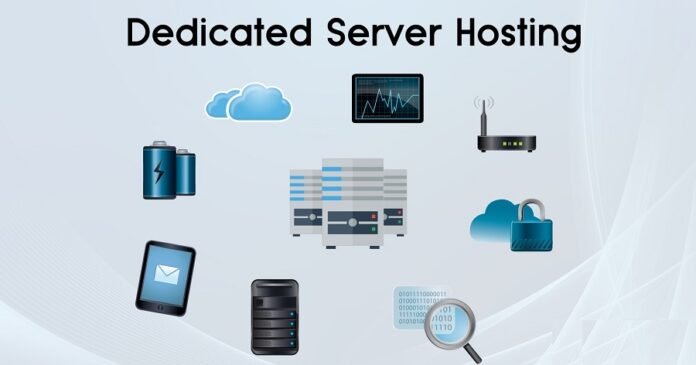In today’s digital landscape, web hosting stands as the cornerstone of a successful online presence. It’s the invisible force that powers websites, ensuring they are accessible to users worldwide. However, not all web hosting solutions are created equal, and this article delves into why choosing the right one can make a monumental difference.
Web hosting serves as the foundation upon which websites are built. It determines their speed, security, and overall performance. Without reliable hosting, even the most beautifully designed websites can falter, resulting in lost visitors and revenue.
The primary focus of this article is to shed light on the paramount significance of dedicated server hosting. In a digital landscape characterized by ever-increasing demands for scalability and high performance, dedicated servers emerge as a beacon of hope for businesses and website owners. Here, we will explore how dedicated server hosting addresses these crucial needs and why it matters in achieving online success. Whether you’re a growing e-commerce business, a content-heavy blog, or an enterprise-level website, understanding the prowess of dedicated servers is essential for your digital journey.
The Role of Scalability in Web Hosting
Understanding Scalability: Scalability is not merely a technical term; it’s the lifeblood of an online presence. In the context of web hosting, scalability refers to the ability of a hosting solution to adapt and expand in response to increased demands. It’s the dynamic quality that ensures your website can handle growth seamlessly. Scalability matters because it’s the bridge between a stagnant online presence and one that can evolve, flex, and thrive.
Scalability and Website Growth: The growth of a website is a beautiful thing, but it comes with challenges. Imagine a brick-and-mortar store suddenly attracting hundreds of customers when it used to have a handful. Without scalability, websites can crumble under the weight of increased traffic and resource demands. Scalability, however, empowers websites to grow without the fear of slowdowns or outages. It’s the safety net that keeps your online business running smoothly, no matter how big it gets. In this section, we’ll explore why scalability is the linchpin of web hosting success.
The Significance of High Performance
High performance in the realm of websites translates to speed, agility, and responsiveness. It means that when a user clicks a link or enters a web address, the site loads swiftly and smoothly. High performance signifies a website’s ability to deliver content, images, and functionalities with minimal delays. In essence, it’s the difference between a website that feels snappy and modern and one that leaves visitors tapping their fingers in frustration.
The impact of performance on user experience cannot be overstated. Research has consistently shown that users are incredibly sensitive to website speed. A one-second delay in page load time can result in higher bounce rates and decreased user satisfaction. On the flip side, a fast-loading website enhances user engagement, encourages longer visits, and ultimately leads to higher conversion rates. In this section, we’ll explore why high performance isn’t just a luxury but a fundamental necessity for websites in today’s digital age.
What Is Dedicated Server Hosting?
Dedicated server hosting is a premier web hosting solution characterized by its exclusivity and power. In this hosting model, a single physical server is devoted entirely to one client or website. Unlike shared or VPS hosting, where multiple users share server resources, a dedicated server is like having a private estate in the digital realm. It means that every ounce of processing power, storage, and bandwidth is at your disposal, and you won’t be affected by the activities of neighboring websites.
The uniqueness of dedicated servers lies in their exclusivity and control. When you opt for dedicated hosting, you’re not sharing your server’s resources with anyone else. This translates to enhanced performance, reliability, and security. You have the keys to the kingdom, with the ability to customize server settings, install software tailored to your needs, and optimize performance for your specific requirements. In this section, we’ll delve deeper into the exceptional features that make dedicated servers stand out in the web hosting landscape.
Scalability in Dedicated Server Hosting
Scalability Advantages: Scalability isn’t just a buzzword; it’s a lifeline for websites in an ever-changing digital landscape. Dedicated server hosting is designed with scalability in mind. Whether your website experiences a sudden surge in traffic or anticipates steady growth, dedicated servers can adapt seamlessly. In this section, we’ll delve into the scalability options offered by dedicated server hosting and how they empower your website to evolve without missing a beat.
Benefits of Dedicated Resources: One of the key drivers of scalability in dedicated server hosting is the concept of dedicated resources. Unlike shared hosting, where multiple websites jostle for limited resources, dedicated servers provide exclusive access to computing power, RAM, storage, and bandwidth. This dedicated allocation ensures that your website enjoys consistent performance, even during traffic spikes or resource-intensive operations. In this part, we’ll uncover how dedicated resources are the cornerstone of unparalleled scalability in the hosting world.
High Performance with Dedicated Servers
Performance Optimization: Dedicated servers are synonymous with high performance, making them the go-to choice for resource-intensive websites. In this section, we’ll explore how dedicated servers optimize performance to deliver blazing-fast loading times and seamless user experiences. From lightning-quick data retrieval to robust processing capabilities, dedicated servers are engineered for peak performance.
Factors Contributing to High Performance: Several factors contribute to the exceptional performance of dedicated servers. We’ll dive deep into the hardware advantages, including powerful CPUs, ample RAM, and speedy SSD storage, that ensure your website runs at its best. Additionally, we’ll discuss how the absence of resource-sharing, as seen in shared hosting, eliminates bottlenecks and resource contention, guaranteeing consistently high performance.
Key Considerations When Choosing Dedicated Hosting
When it comes to selecting a dedicated hosting provider, several crucial factors need to be considered. Here, we’ll walk you through the key considerations to ensure you make an informed decision:
- Server Specifications: Start by evaluating the server’s hardware specifications. Look for factors like CPU type and speed, RAM capacity, storage options (HDD or SSD), and bandwidth limits. Ensure that the server meets your website’s resource demands.
- Managed vs. Unmanaged: Decide whether you need a managed or unmanaged dedicated server. Managed hosting includes technical support and server management, while unmanaged hosting requires you to handle these aspects yourself.
- Scalability: Consider your website’s growth potential. A good hosting provider should offer scalability options, allowing you to easily upgrade or downgrade server resources as your needs change.
- Uptime Guarantee: Check the provider’s uptime guarantee. You want your website to be accessible to users around the clock, so a high uptime percentage is crucial for reliability.
- Data Center Location: The physical location of the data center matters. Choose a data center that is geographically close to your target audience to minimize latency and improve website loading times.
- Security Measures: Security is paramount. Inquire about the provider’s security measures, including firewalls, DDoS protection, intrusion detection, and regular security audits.
- Technical Support: Ensure that the hosting provider offers 24/7 technical support. You may encounter issues at any time, and having responsive support is invaluable for troubleshooting and problem resolution.
- Backup and Disaster Recovery: Check the backup and disaster recovery options. Regular data backups and a robust disaster recovery plan are essential to safeguard your website’s data.
- Network and Bandwidth: Assess the network infrastructure and available bandwidth. A reliable network with sufficient bandwidth ensures your website can handle traffic spikes without slowdowns.
- Service Level Agreement (SLA): Read the SLA carefully. It outlines the provider’s responsibilities, including uptime guarantees, response times for support requests, and compensation for downtime.
- Reviews and Reputation: Research the hosting provider’s reputation. Read customer reviews and testimonials to gauge the experiences of other users.
- Price and Contract Terms: Understand the pricing structure and contract terms. Look out for hidden fees and ensure that the pricing aligns with your budget.
- Data Privacy and Compliance: If your website deals with sensitive data, consider data privacy and compliance requirements, such as GDPR or HIPAA, and ensure that the hosting provider can meet them.
- Migration Assistance: If you’re transferring from another hosting provider, check if the new host offers migration assistance to streamline the process.
In conclusion, selecting the right dedicated hosting provider is a critical decision that can significantly impact your website’s performance, reliability, and security. By carefully weighing the server specifications, management options, scalability, uptime guarantees, security measures, and other key considerations, you can make an informed choice that aligns with your website’s requirements. Remember that dedicated hosting offers unparalleled control and resources, making it an excellent choice for resource-intensive websites and applications. So, choose wisely, and your website will thrive in a high-performance hosting environment.
Must Read: The Top 6 Best Dedicated Server Hosting Providers






























































